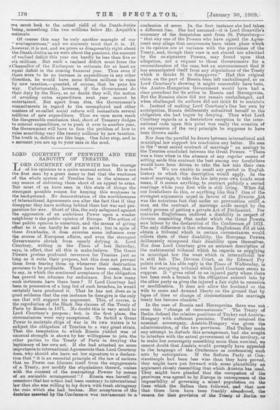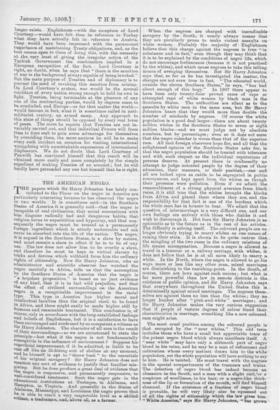LORD COURTNEY OF PENWITH AND THE SANCTITY OF TREATIES. .ORD
COURTNEY OF PENWITH has the courage • of his opinions to a quite unusual extent. He is not the first man by a great many to feel that the weakness of the whole system of Treaties lies in the absence of any means of enforcing them short of an appeal to arms. But most of us have seen in this state of things the strongest possible reason for keeping this weakness in the background. No demonstration of the worthlessness of international Agreements can alter the fact that if they disappear they leave nothing behind them but war and pre- paration for war. Short of this, the only safeguard against the aggression of an ambitious Power upon a weaker neighbour is the public opinion of Europe. The action of that public opinion is uncertain, and the means of giving effect to it can hardly be said to exist ; but in spite of these drawbacks, it does exercise some influence over the course of European affairs, and even the strongest Governments shrink from openly defyiug it. Lord Courtney, writing in the Times of last Saturday, says, in effect, that all this is make-believe. The Great Powers profess profound reverence for Treaties just so long as it suits their purpose, but this does not prevent them from tearing them up whenever their destruction promises to be profitable. There have been cases, that is to say, in which the continued acceptance of the obligation hae proved too irksome for endurance. But how many .,sucib instances have there been ? If Lord Courtney had been in possession of a long list of such breaches, be would certainly have produced it. That he has not done so is ?good evidence that the one instance he does give is the only one that will support his argument. This, of course, is the repudiation of the Black Sea clauses of the Treaty of Paris by Russia in 1871. No doubt this is very much to Lord Courtney's purpose ; but, in the first plaee, the circumstances were very exceptional. To forbid a Great Power to maintain ships of war in its own waters is to subject the obligation of Treaties to a very great strain. 'That the temptation to which Russia yielded was of unusual strength is shown by her willingness to join the other parties to the Treaty of Paris in denying the legitimacy of her own act. If she had attached no more importance to international Agreements than Lord Courtney deem, why should she have set her signature to a declara- tion that "it is an essential principle of the law of nations that no Power can liberate itself from the engagements of a Treaty, nor modify the stipulations thereof, unless with the consent of the contrasting Powers by means of an amicable arrangement" ? Russia was herself so conscious that her action had been contrary to international law that she was willing to lay down with fresh stringency the rule which she had broken. Her acceptance of the doctrine smarted by the Conference was tantauseunt to a confession of error. In the first instance she had taken a different line. She had assumed—it is Lord Granville's summary of the despatches sent from St. Petersburg- " that any one of the Powers who have signed the Agree- ment may allege that occurrences have taken pled() which in its opinion are at variance with the provisions of the Treaty, and, though their view is not shared nor admitted by the co-signatory Powers, may found upon that allegation, not a request to those Governments for a reconsideration of the case, but an announcement that it has emancipated itself from any stipulations of the Treaty which it thinks fit to disapprove." Had this original claim on the part of Russia been left unchallenged, as on Lord Courtney's showing it might reasonably have bean, the Austro-Hungarian Government would have had a clear precedent for its action in Bosnia and Herzegovina. But the Russian claim did not remain unchallenged, and when challenged its authors did net think fit to maintain it. Instead of making Lord Courtney's line her Own by• anticipation, Russia deliberately submitted herself to the obligation she had begun by denying. Thus what Lord Courtney regards as a destructive exception to the inter- national code upon this point was really the occasion of an expression of the very principle he supposes to halm, been thrown aside.
Nor does the parallel he draws between international and municipal law support his conclusion any better. He sees in the "most sacred contract of marriage" an analogy to the Treaties concluded between the Great Powers. " Thera was a time when in the absence of any regular means of setting aside this contract the best among our forefathers would have been driven to take the law into their own hands." We are unable to recall any period in Engliah history to which this description would apply. In the case of marriage, to take the law into your awn hands must mean, if it means anything, to contract publicly a second marriage while your first wife is still living. When did our forefathers do this, or anything like this? One of the strongest arguments urged in favour of the Divorde ,Act was the notorious fact that under no prirvocation cout a man set the contract of marriage aside except by the costly process of getting a private Act of Parliament. Fbr. 1, ci centuries Englishmen endured a disability in respect of divorce resembling that under which the Great °welts now labour by the declaration of the Conference o 1.874., The only difference is that whereas Englishmen did at last obtain a tribunal which in certain circumstances would, • relieve thin of their disability, the European POW011 deliberately reimposed their disability upon themselves. Nor does Lord Courtney give an accurate description of the matrimonial tribunal which be regards as supplying in municipal law the want which in international law is still felt. The Divorce Court, as Sir Edward Fry points out in his able reply in the Times of Wednesday, is not the easygoing tribunal which Lord Courtney seems to suppotie. It "gives relief to an injured party where there has been such a breach in the obligation entered into by the other party as gives the injured a fair right to recession or modification. It does not allow the husband or the wife to come and demand liberty on the ground that by lapse of time or change of circumstances the marriage, treaty has become obsolete."
In the case of Bosnia and Herzegovina there was even this "change of circumstances." The Treaty of Berlin defined the relative positions of Turkey and Austria. Hungary with sufficient precision. Turkey retained the nominal sovereignty, Austria-Hungary was given the administration, of the two provinces. Had Turkey mad* any attempt to disturb this arrangement, had she sought to interfere with the actual government of the territory, or to make her sovereignty something more than nominal, we cannot doubt that Austria would promptly have appealed to the language of the Conference as condemning sutdi acts by anticipation. If the Reform Party at Con- stantinople had been less wise than they have proved. they might have put forward with some plansibility an argument closely resembling that which Austria has used. They might have pleaded that the occupation of the provinces was agreed to by Europe in consequence of the impossibility of governing a mixed population on the lines which the Sultan then followed, and that now that these lines have been frankly abandoned, the reason for that provision of the Treaty of Berlin 319 longer exists. Englishmen-,with the exception of Lord Courtney—would have felt then in reference to Turkey 'what they have actually felt in . reference to Austria. They would have been impressed with the paramount importance of maintaining Treaty obligations, and, as the best means open to them of doing this, with the necessity at the very least of giving the irregular action of the Turkish Government the condonation implied in a European recognition of the fact. Lord Courtney is right, no doubt, when he says that "there is the sanction of war in the background always capable of being invoked." Btit the main purpose of Treaties and of diplomacy is to prevent the need of invoking this sanction from arising; On Lord Courtney's system, war would be the normal condition of every nation strong enough to hold its own in fight. Treaties, being terminable at the pleasure of any one of the contracting parties, would by degrees cease to be concluded, and Europe—or for that matter the world—. iveuld become in fact, what it is sometimes called in anti- militarist oratory, an armed camp. Any approach to this state of things should be opposed by every real lover of peace. The more he regrets that Treaties are not in- variably carried out, and that individual Powers will from time to time seek to gain some advantage for themselves by overriding them, the more anxious he will be to make every such incident an occasion for visiting international wrongdoing with unmistakable expressions of international displeasure. We do not doubt that Lord Courtney of Penwith has convinced himself that this result will be obtained more easily and more completely by the simple expedient of making Treaties of no account; but he will hardly have persuaded any one but himself that he is right.

























































 Previous page
Previous page